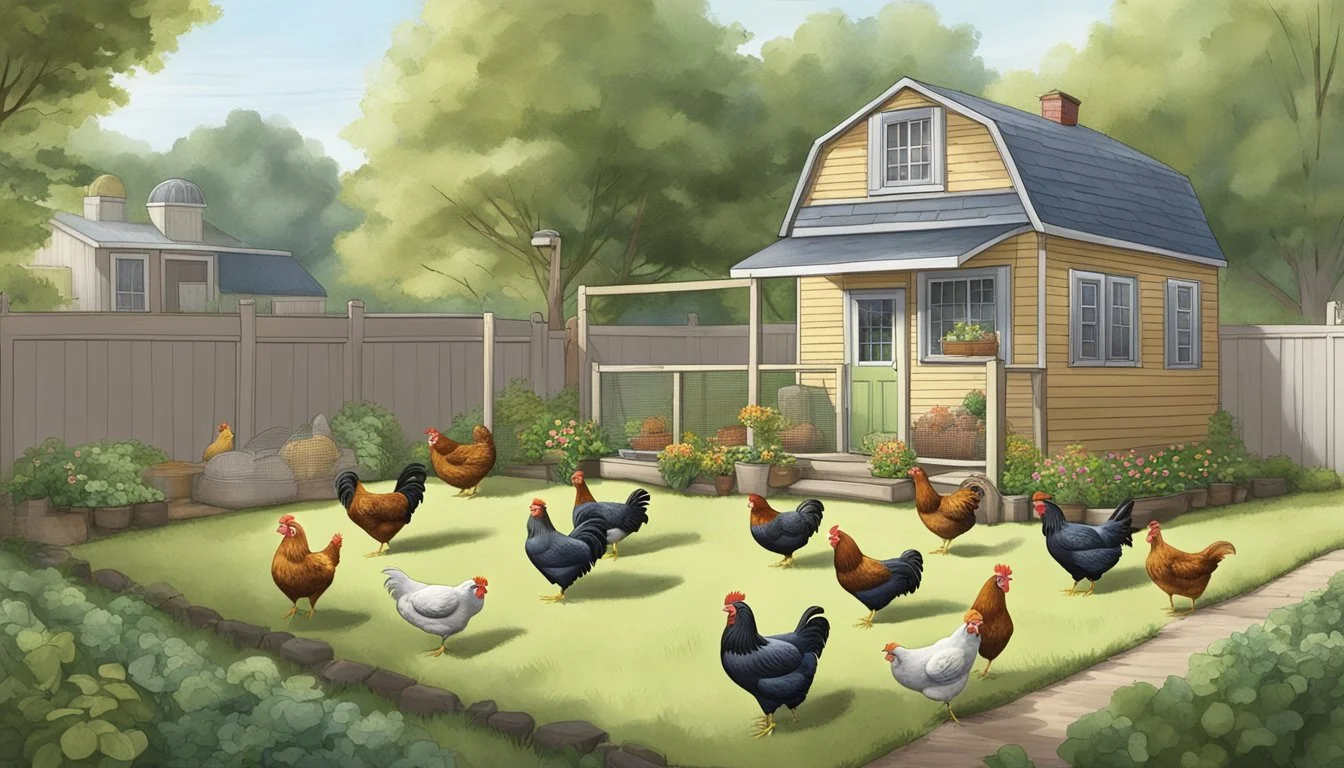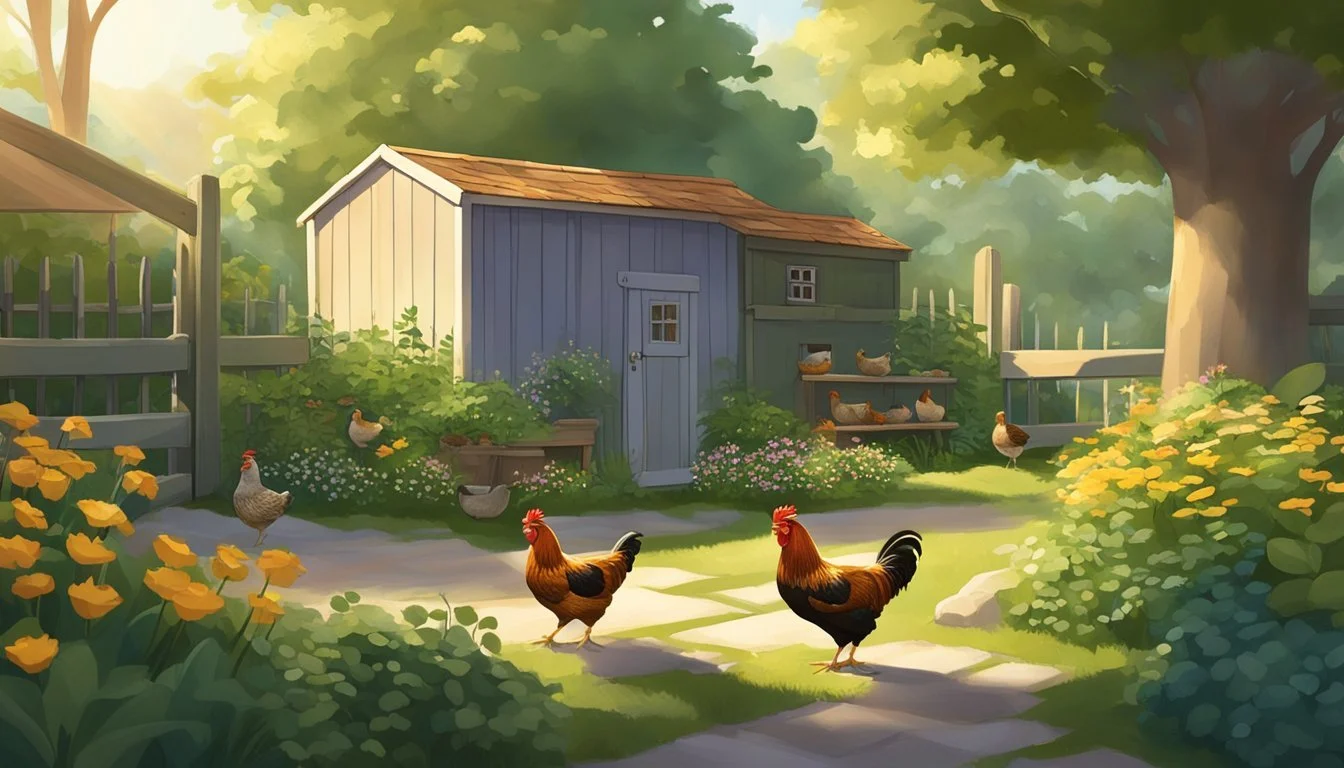Keeping Backyard Chickens in South Bend, IN
A Local's Guide to Urban Poultry Care
Keeping backyard chickens is an increasingly popular hobby that provides not only a source of fresh eggs but also companionship and an opportunity for education on animal care and sustainability. In South Bend, Indiana, the city accommodates this trend with specific ordinances that enable residents to enjoy the benefits of raising chickens in their own backyards. Unlike some cities that heavily restrict or outright ban urban poultry, South Bend presents a model of a more permissive, yet regulated, environment for aspiring and seasoned chicken keepers alike.
Regulations in South Bend permit the keeping of up to six chickens in residential areas. This allowance helps to ensure that families can maintain a small flock sufficient for personal use without causing disruption to the neighborhood. It's important to be aware that while hens are welcome, the possession of roosters is prohibited within the city to avoid noise complaints. Additionally, the city has specified that commercial activities such as selling eggs or butchering on the property are not allowed, helping to keep the practice of keeping backyard chickens firmly within the realm of hobbyist activity rather than commercial agriculture.
For residents interested in this pursuit, it's crucial to understand that cleanliness is a top priority, with daily cleaning of chicken coops required to maintain sanitary conditions and minimize any potential complaints or health hazards. Moreover, while a proposed amendment that sought to require neighbor's permission for keeping chickens was not passed, good community relations are still encouraged through responsible and considerate chicken keeping practices.
Understanding Local Chicken Ordinances in South Bend
Navigating local ordinances is essential for South Bend residents who wish to keep backyard chickens legally and without issue.
Overview of South Bend Chicken Laws
Within South Bend, Indiana, local chicken laws are in place to govern the keeping of backyard chickens. The City of South Bend stipulates that roosters are prohibited within city limits to prevent noise disturbances. Local ordinances outline specific requirements for the housing and management of chickens, including coop and run criteria to ensure the well-being of the chickens and to maintain cleanliness in the urban environment.
Permits and Regulations for Keeping Chickens
Permits are mandatory for residents who want to keep backyard chickens. The permit process involves:
Submitting an application: Residents must complete the required documentation to apply for a permit.
Paying any associated fees: There is a fee involved in the permit process, which contributes financially to local government oversight.
The local ordinance caps the maximum number of chickens permitted on a property, and this number varies based on individual circumstances and property size. Compliance with these permits and regulations is essential for sustaining an urban agriculture practice in alignment with South Bend's community standards.
Setting Up Your Chicken Coop
When setting up a chicken coop in South Bend, Indiana, one must pay special attention to the location, predator-proofing, and maintenance for ventilation and cleanliness to ensure a healthy environment for backyard chickens.
Choosing the Right Location
The placement of a chicken coop is fundamental to the well-being of the chickens. South Bend regulations stipulate that a coop should be at least 20 feet from any neighboring dwellings and 15 feet from property lines. The location should also provide the chickens with exposure to sunlight and shade and be on high ground to avoid any issues with water pooling.
Designing a Predator-Proof Coop
Security against predators is paramount when designing a chicken coop. All doors and windows should be fitted with secure latches that cannot be easily opened by raccoons or other inquisitive predators known to undo knots, lift latches, or slide deadbolts. Hardware cloth, not chicken wire, is recommended to cover windows and runs as it is more durable against break-ins.
Ensuring Proper Ventilation and Cleanliness
A well-ventilated and clean coop is essential to prevent respiratory issues and the spread of disease. Design the coop with ample ventilation, using vents or windows that can be closed in bad weather. Each chicken should have a minimum of 3 square feet inside the coop and cleanliness must be maintained by regular removal of waste and refreshing of bedding.
Managing Your Backyard Flock
Maintaining a healthy and legally compliant backyard flock in South Bend requires understanding local regulations, proper daily care, and preventive measures for health issues.
Number and Type of Chickens Allowed
In South Bend, residents are limited to keeping a maximum of six chickens in their backyards. It is important to note that roosters are prohibited to avoid noise disturbances. Those interested in keeping chickens must also ensure they comply by acquiring the necessary permits.
Daily Care and Maintenance
Chickens require daily attention to ensure their wellbeing. They should have consistent access to fresh water and a diet that meets their nutritional needs, which varies depending on their age and purpose, whether it be for egg-laying or meat.
Age Range Recommended Feed 0-8 weeks 18-20% starter feed crumbles 8-14 weeks 16-18% starter/grower feed 15-18 weeks 16% finisher feed
Clean, spacious, and predator-proof housing is critical. Regular cleaning of the coop to remove waste and spent bedding promotes a healthy environment for the backyard flock.
Health Concerns and Disease Prevention
One should monitor their backyard flock regularly for signs of illness, which includes but is not limited to lethargy, reduced appetite, abnormal droppings, or decreased egg production. Preventive measures such as vaccinations and parasite control are essential to maintain flock health. Good hygiene practices and biosecurity measures can greatly reduce the risk of disease spread among chickens.
Living with Chickens in Urban Environments
Keeping chickens in an urban setting such as South Bend, Indiana, entails navigating city ordinances and being considerate of community standards. Residents must address concerns about noise, smell, slaughtering restrictions, and maintaining positive relationships within the neighborhood.
Dealing with Noise and Smell
Noise: One of the primary concerns with urban chicken keeping is noise management. South Bend's regulations prohibit roosters within city limits to minimize disturbances. Residents are allowed to keep up to six hens, which are generally quieter. Regular coop maintenance can also reduce noise levels, as chickens are less likely to vocalize distress when their environment is clean and comfortable.
Smell: Effective odor control begins with daily cleaning of the coop and proper waste management. Composting chicken manure and soiled bedding can help mitigate smells while providing garden fertilizer.
Understanding Slaughtering Restrictions
Slaughtering: South Bend's chicken ordinance does not permit butchering chickens on residential property. This maintains the city's public health standards and community comfort. Individuals must find alternative locations compliant with local regulations if they wish to process chickens for meat.
Community Relationships and Public Health
Community Relationships: Good relations with neighbors are essential when raising chickens. While an amendment requiring neighbor permission for backyard flocks failed, consideration and communication about potential impacts are paramount. Transparent discussions about flock management can foster understanding and cooperation.
Public Health: Maintaining the health of both chickens and the community requires adherence to local ordinances designed to prevent the spread of diseases. This includes proper vaccinations, pest control, and careful monitoring of the flock's health.
By adhering to these practices, residents can enjoy the benefits of urban poultry keeping while respecting the environment and public health concerns in South Bend.
Comparing South Bend to Other Indiana Cities
South Bend, Indiana, has specific regulations for backyard chicken keeping that vary from other municipalities in the state. Each city balances local ordinances, community preferences, and practical considerations to create their rules.
Chicken Keeping Laws in Indianapolis
Indianapolis allows residents to keep chickens, but the city has a no-rooster policy to prevent noise disturbances. Residents must provide adequate space and proper enclosures for their chickens. The capital city requires chicken keepers to ensure their animals do not create nuisances for neighbors, highlighting its responsibility-focused approach.
Regulations in Fort Wayne and Surrounding Areas
Fort Wayne's regulations mandate that coops must be kept clean and sanitary, and birds must be confined to their owner's property. Surrounding areas may have slight variations, but they generally follow Fort Wayne's lead in prioritizing community harmony and sanitation.
Differences in Chicken Ordinances Across Municipalities
Indiana's municipalities have a patchwork of chicken ordinances:
Bloomington and Carmel: Typically less restrictive, focusing on the well-being of the chickens and the cleanliness of the coops.
Evansville and Gary: More stringent, with limits on the number of chickens and the requirement of permits.
South Bend: Similar to St. Joseph County, prohibits roosters and requires a permit for backyard chickens.
The differences often reflect community needs and urban density concerns, with more populous cities like Indianapolis and Fort Wayne offering detailed regulatory frameworks.
Additional Considerations and Resources
When deciding to keep backyard chickens in South Bend, IN, residents should be mindful of the various fees and fines associated with violations of the city's chicken ordinances. It is also beneficial to consult a variety of educational materials and references to ensure responsible chicken ownership.
Associated Fees and Fines
Permit Acquisition:
Application Fee: South Bend residents are required to submit a permit application along with any applicable fees. These fees contribute to the administrative costs of maintaining the backyard chicken program.
Non-Compliance Penalties:
Fines: Fines may be imposed for failing to adhere to coop standards, cleanliness, and other regulations stated by South Bend ordinances.
Educational Materials and References
Available Resources:
Residents can access a range of educational materials regarding the care, feeding, and housing of chickens to comply with city regulations.
Contact Information for Further Guidance:
City of South Bend
Address: 1200 County-City Building, 227 W. Jefferson Blvd, South Bend, Indiana 46601
Phone: 574.235.9216
Additional References:
For a comprehensive understanding, owners may refer to resources at the USA state level, as state laws may also apply to the keeping of backyard chickens.








